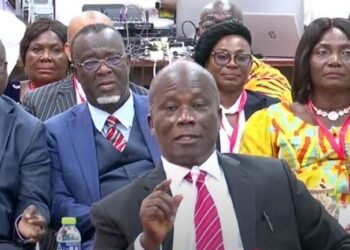Banking and governance expert Richmond Atuahene has raised serious concerns about Ghana’s gold mining agreements, calling for immediate reforms to reclaim greater value from the country’s natural resources.
Mr. Atuahene disclosed that Ghana exported approximately US$43 billion worth of gold between 2014 and 2023 but received just US$6.7 billion in returns—representing a mere 14.8 percent of the total.
“Go to the Bank of Ghana records, and you’ll see the shocking truth.
“We extracted US$43 billion worth of gold, but only US$6.7 billion came back to the country. That means someone else took over US$36 billion. How is this acceptable?”
Mr. Richmond Atuahene, Banking and Governance Expert
Mr. Atuahene compared Ghana’s mining agreements to lopsided foreign direct investment deals that favour multinational corporations at the expense of the host country.
He described the existing contractual terms as “exploitative” and called into question why Ghana continues to accept such a disproportionate share of its own mineral wealth.

“If someone brings a car to sell to you, do they determine the price for you?
“Why do we allow foreign companies to take 85 percent of our gold revenues while we manage with 14 percent?”
Mr. Richmond Atuahene, Banking and Governance Expert
He argued that Ghana, despite being Africa’s top gold producer, is not reaping the benefits it deserves due to the structure of its agreements with mining firms—many of which allow for generous tax holidays, minimal royalties, and unrestricted repatriation of profits.
Citing Tanzania’s late President John Magufuli as an example of assertive leadership, Mr. Atuahene pointed out how Tanzania renegotiated its mining contracts, secured better terms, and redirected those gains into national development projects such as airports, railway lines, and energy infrastructure.
“We need that kind of leadership—bold, pragmatic, and ready to prioritise the national interest.
“Ghana must move beyond symbolic ownership and demand tangible, measurable returns from its natural resources.”
Mr. Richmond Atuahene, Banking and Governance Expert
Policy Gaps

Mr. Atuahene warned that unless Ghana urgently revisits its mining and resource contracts, the country will continue to forfeit billions in potential revenue.
He criticized the prevailing narrative that attracting foreign investment requires extreme concessions, arguing that it undermines the country’s long-term economic sovereignty.
“We can’t afford to sit and watch our future be siphoned off in the name of investment.
“Other resource-rich nations have demanded better—and so should we.”
Mr. Richmond Atuahene, Banking and Governance Expert
He emphasized that the issue is not just about economics but about justice, equity, and national dignity. “Our resources must work for our people, not for the enrichment of foreign shareholders in London, Toronto or Johannesburg,” Mr. Atuahene said.
Mr. Atuahene’s remarks come amid growing public scrutiny of natural resource management in Ghana. Civil society organisations, environmental groups, and economists have increasingly called for greater transparency in contract negotiations and revenue tracking.

He called on policymakers, legislators, and ordinary citizens to demand a renegotiation of existing contracts and to ensure that any future agreements are based on equity, sustainability, and national interest.
“We need a transparent audit of all mining contracts. Let the public see the numbers.
“Let us know what we are really getting—and what we are giving away.”
Mr. Richmond Atuahene, Banking and Governance Expert
Mr. Atuahene also urged the government to consider local participation models, value addition through local processing, and stronger regulatory oversight of mining activities.
Ultimately, the challenge for Ghana will be to balance the need to attract foreign investment with the imperative to secure fair returns from its natural resources.
Without a significant overhaul of its current mining contracts, the country risks perpetuating a cycle in which much of its resource wealth benefits foreign investors at the expense of sustainable, long-term national development.
READ ALSO: Wencai Zhang Calls on Finance Minister, Pledges Stronger World Bank-Ghana Partnership




















